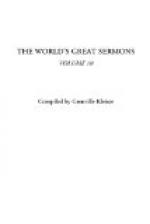But the sage was also thinking of men whose hopes were broken, and whose lives were baffled and beaten. These exiles, crossing the desert, might have claimed for themselves the poet’s phrase, “Lo, henceforth I am a prisoner of hope.” Like Dante, they might have cried, “For years my pillow by night has been wet with tears, and all day long have I held heartbreak at bay.” For these whose glorious youth had been exhausted by bondage, life had run to its very dregs. Gone the days of glorious strength! Gone all the opportunities that belong to the era when the heart is young, the limitations of life had become severe! Environment often is a cage against whose iron bars the soul beats bloody wings in vain!
How many men are held back by one weak nerve, or organ! How many are shut in, and limited, and just fall short of supreme success because of an hereditary weakness, handed on by the fathers! How many made one mistake in youth in choosing the occupation and discovered the error when it was too late! How many erred in judgment in their youth, through one critical blunder, that has been irretrievable, and whose burden is henceforth lasht to the back! In such an hour of depression, Isaiah assembles the exiles, and exclaims, “Comfort ye, comfort ye, my people. Tho your young men faint and be weary, tho the strong utterly fail, yet God is the unwearied one; with his help thou shalt take thy burden, and mount up with wings as eagles; with his unwearied strength thou shalt run with thy load and not be weary, and walk and not faint.” For this is the experience of persecution and the reward of sorrow, bravely borne that the fainting strength of man is supplemented by the sure help of the unwearied God.
Therefore, in retrospect, exiles, prisoners, martyrs, who have believed in God seem fortunate. The endungeoned heroes often seem the children of careful good fortune and happiness. The saints, walking through the fire, stand forth as those who are dear unto God. How the point of view changes events. Kitto was deaf, and in his youth his deafness broke his heart, but because his ears were closed to the din of life, he became the great scholar of his time, and swept the treasures of the world into a single volume, an armory of intellectual weapons. Fawcett was blind, but through that blindness became a great analytic student, a master of organization, and served all England in her commerce. John Bright was broken-hearted, standing above the bier, but Richard Cobden called him from his sorrow to become a voice for the poor, to plead the cause of the opprest, and bring about the Corn Laws for the hungry workers in the factories and shops. Comfort ye, comfort ye, my people.




